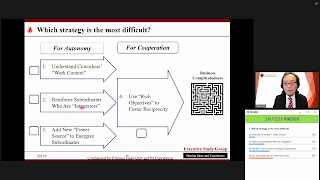The Executive Study Group (ESG) online seminar named “Team Leadership:
“Smart Leadership” to Empower Your Team to Solve New Problems” was held by the
ESG, Asia Pacific Institute for Strategy Limited (APIFS) on 13th May
2021. In the beginning, Dr. Mark Lee
briefed the background, history and goal of Asia Pacific Institute for Strategy
Limited (APIFS), as well as Industry-support during Covid-19. The content included “Business
Complicatedness”, “Smart Leadership for Self-Initiated Problem Solving” and “The
Opportunity within Covid-19”.
In the beginning, Dr. Mark Lee used a leading hotel case to explain the
barrier for self-initiated problem solving by frontline staff even though more
incentives and training applied. Then he
raised a poll to survey do our business operation become more or less complicated.
Most participants selected more complicated (53%) of their business operation
compared with 5 years ago.
Then Dr. Lee explained the rapid increase of complicatedness continuously. KPI driven organizations would be one of
indicators and caused conflicting goals and discouraged team cooperation.
And then he mentioned carrot-and-stick became ineffective in digital era
because of job dissatisfaction and more passion staff to be more disappointment
under highly complicated procedures.
In order to motive passion staff, it needed to equip staff for Autonomy
and Cooperation. So that he introduced
the objective of smart leadership.
Two key factors of smart leadership were Autonomy and Cooperation. Autonomy could empower right people to make
good choice that motivating people for cooperation.
After that the 4 elements
of Smart Leadership from Autonomy to Cooperation were discussed and they included
for items as follows:
1. Understand Coworkers’ “Work Context”
2. Reinforce Subordinates Who Are “Integrators”
3. Add New “Power Source” to Energize Subordinates
4. Use “Rich Objectives” to Foster Reciprocity
For Work Context, there separated into four elements and they were
Goals, Challenges, Resource and Constraints.
Then the second poll was to select the most difficult one. 50% of participants voted “Constraints”.
And then he introduced to identify Integrators to solve internal
conflict and to reinforce power to them.
The 3rd poll of
integrators about which the following empower step was the most difficult?
1. Increase their responsibilities (23%)
2. Give them a greater say on issues that matter to
others (33%)
3. Remove some formal rules and procedures (44%)
Add New Power Source to enforce cooperation was discussed and without
taking power away from others in the system.
By giving individuals new responsibility for issues that matter to
others and to the company’s performance.
Finally, Dr. Lee explained how to rich objectives and expanded the boundaries. He used airline service as example.
And briefed the virtuous
cycle by common interests that included the following steps.
1. Right Level Cleaness
2. On-time Departure
3. Less Customer Complaints
4. Easier to manage passengers
5. Arrive home on time, more time to clean next
Lastly, he raised some opportunity to employ smart leadership during
Covid-19 that unlocked staff potentials for value-adding works.
At the end, the last poll was which strategy was the most
difficult? Use “Rich Objectives” to
Foster Reciprocity (36%) and Add New “Power Source” to Energize Subordinates (31%)
were most participants voted.
Reference:
Asia Pacific Institute for Strategy Limited (亞太策略研究所有限公司) – www.apifs.org
ESG facebook - https://www.facebook.com/groups/esg08















沒有留言:
發佈留言